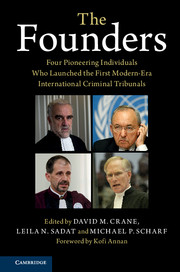 The Founders
The Founders Preface
Published online by Cambridge University Press: 23 March 2018
Summary
This extraordinary book project began over a glass of wine during the annual International Humanitarian Dialogs at the world famous Chautauqua Institution in 2015. Each year, most of the world's international chief prosecutors gather to reflect upon the various issues and challenges pertaining to modern international criminal law. The prosecutors are all friends, and the meetings are informal and collegial. One evening, sitting together on the famous porches of the Athenaeum Hotel while we sipped our wine, I asked my colleagues, somewhat rhetorically, whether any one of us ever actually had asked for the unique job of being a chief prosecutor of an international war crimes tribunal? Not one of us actually asked for, sought out, or applied for the positions we would eventually fill in Yugoslavia, Rwanda, Sierra Leone, or Cambodia, even as prosecutors of the International Criminal Court.
As it turns out, as we went around telling our selection stories, we all got what we called “the phone call.” Unexpected, surprising, and/or “out of the blue,” so to speak, we received that call asking us whether we would consider being a chief prosecutor. Four of us got the call not only to be prosecutors, but also to help create a brand new tribunal.
After we all left Chautauqua, as I flew home to Maggie Valley in North Carolina, I realized that there have only been five individuals who have created an international justice mechanism. Four of us exist in the modern era. The first was Robert H. Jackson, who had passed decades earlier. As I continued to mull this over, I came to the realization that no chief prosecutor has ever written about how they created the prosecution office of their tribunals. Wouldn't it be amazing if I could get my colleagues who created the five modern international tribunals to write about that experience in a book? Hence the idea of The Founders was floated by those founding chief prosecutors, and each agreed to write a chapter on their experiences in the creation of the tribunals in Yugoslavia, Rwanda, Sierra Leone, the ICC, and Cambodia. As one of those founders for the tribunal in Sierra Leone, I would write that chapter.
Information
- Type
- Chapter
- Information
- The FoundersFour Pioneering Individuals Who Launched the First Modern-Era International Criminal Tribunals, pp. xvii - xviiiPublisher: Cambridge University PressPrint publication year: 2018